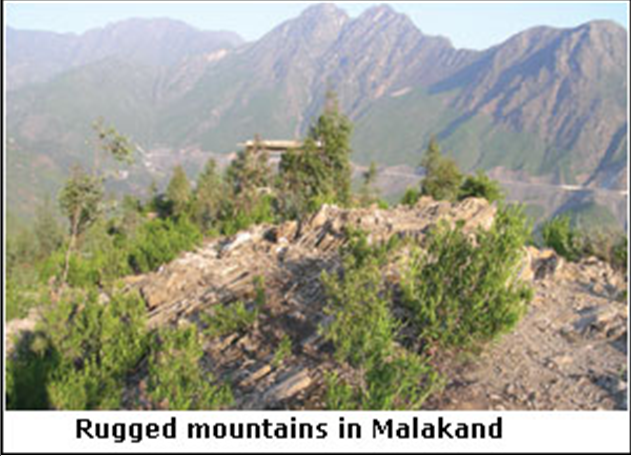Malakand
This is a collection of articles archived for the excellence of their content. Readers will be able to edit existing articles and post new articles directly |
Malakand
Sir Winston and Malakand
By Asim Effendi
“The story should be told as it happened,” wrote Sir Winston Churchill in his book The Story of Malakand Field Force. “I dedicate this piece to the young lieutenant of 31st Punjab Regiment, who later won WW2 for his country. I would not disappoint his spirit and would tell the story as he desired while covering the war in the rugged mountains of Malakand for the Daily Telegraph.” I was reminded of these lines while I was staying at the Mahsher fishing hut in Chakdara, overlooking the British-built military signal post. There’s a steep hill here which is now called the ‘Churchill Picket’.
Sipping tea under the shade of Chenar trees along the River Swat made the region look mystic. The sight reminded me of Sir Winston Churchill enjoying the post-campaign hospitality of Bajaur’s local Khans while being a silent spectator of the disarmament negotiations carried out by the then political agent of the area, Major Deane. The intriguing part was the surprise and shock the young lieutenant expressed in his book regarding the surrendered arms being from official British-condemned warehouses and could not possibly have made their way to the wild tribes with an inquiry. The young British officer was probably unaware of the actual game behind the ‘Great Game’ of 18th century.
Churchill described his experience in these words, “Of a hundred rifles, which the Utman Khels had surrendered, nearly a-third were condemned government Martinis, and displayed the government stamp. Now no such rifles are supposed to exist. On recovery, the arsenal authorities are responsible for their destruction, and in every case, this is carried out under European supervision. The fact that such rifles are not destroyed but later found in the possession of trans-frontier tribesmen, points to a grave instance of dishonest and illegal traffic carried out by some person connected with the arsenal. It need hardly be said that a searching inquiry was instituted."
No independent historical reference exists to contradict or corroborate the British version of the historical account of the Malakand campaign except local elders who had an insight into the circumstances, passed on to them verbally by their forefathers. The British version of history points at the siege of the fort at Chitral, where the British political mission was housed, and the arrest of its two officers -- Lieutenant Edwards and Fowler — at the hands of Umera Khan, a powerful Khan from Jandul in Bajaur. As a result, the British launched its 1st Division of the Field Army with a force of nearly 16,000 men to cross the frontier on April 1 from Mardan to advance by the shortest route -- the route through Swat and Dir -- under the command of Sir Robert Low.
According to Zoor Zamin Khan, a notable from the town of Batkhela located at the foot of the Malakand pass, "Umera Khan, well known to my grandfather Sultan Shah Yousafzai, mysteriously rose to power, raised ragtag tribal marauders who would carry out unprovoked attacks against all villages. The reason behind Umera Khan’s might was a regular secret supply from a British arms manufacturing company named Scotch & Co from Bombay. He even had artillery pieces at his disposal. One such canon to date is mounted on one of the intersections of Mardan city as a trophy of British victory against their own protégé and stooge.
“On reaching Malakand after some resistance due to excessive force and fire power, the British sent their intelligence officer Feroz Shah Kakakhel in advance to Umera Khan to secure an honourable release of two officers being kept as royal guests and not as war criminals. At the behest of the British, Feroz Shah Kakakhel in return provided a safe passage to Umera Khan to go into exile in Afghanistan, along with sufficient financial support for his family. Nevertheless, the innocent and ill-equipped tribals had to pay in the form of thousands of lives for resisting British presence in Malakand."
The Malakand Fort, reminiscent of the British campaign, is presently occupied by a unit of the Pakistan Army. Inside the fort there exists the room where Churchill had lived. However, it is sad that the marvelous stone masonry done in the British era on one of the four sign posts seems to have been vandalised.

